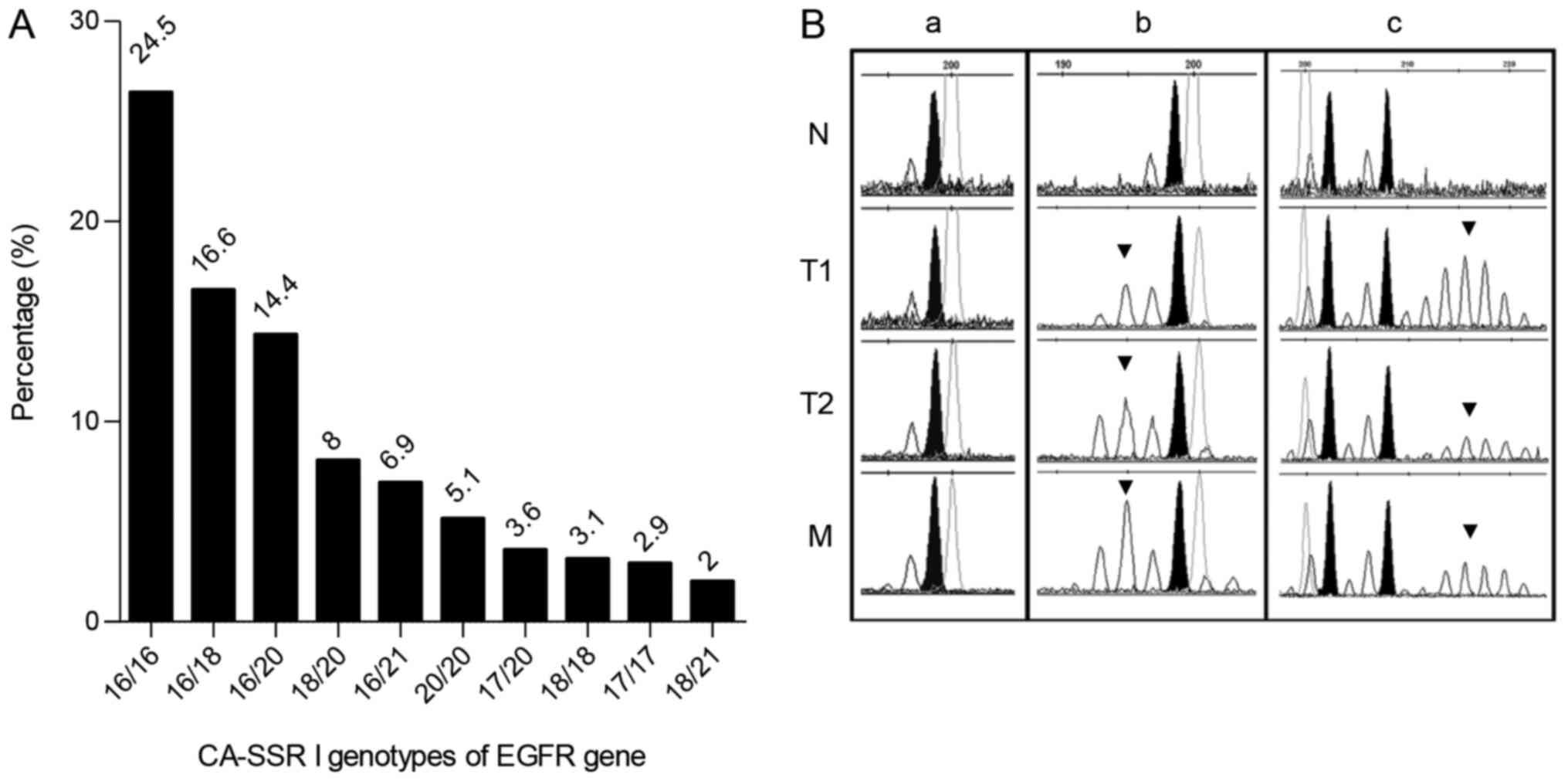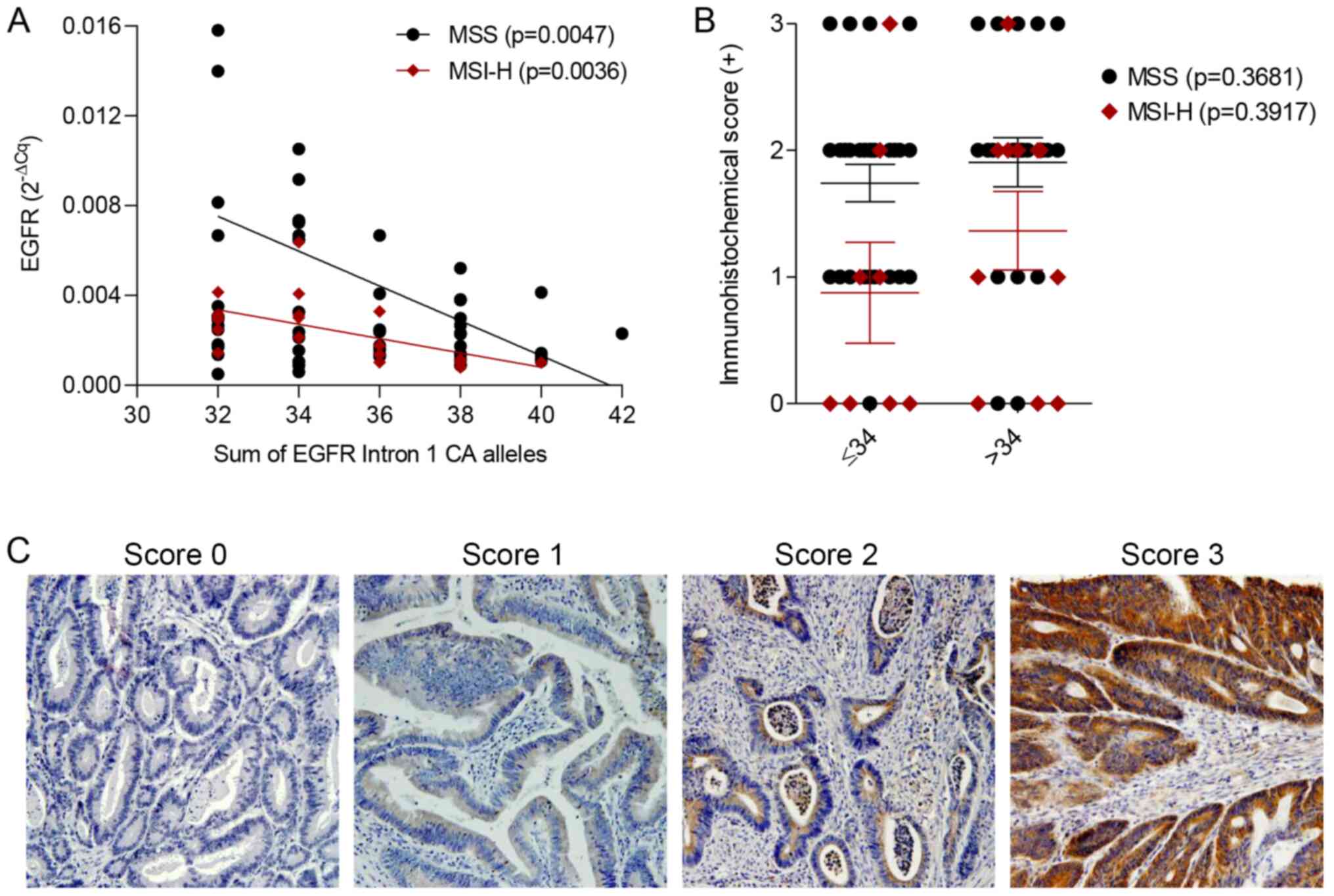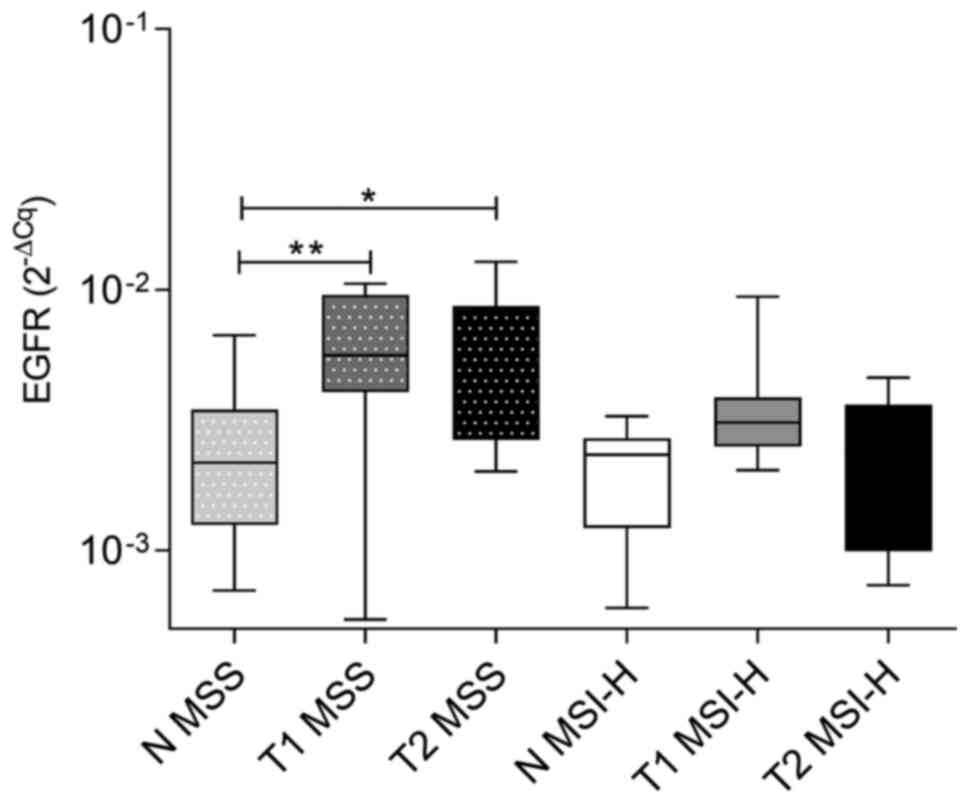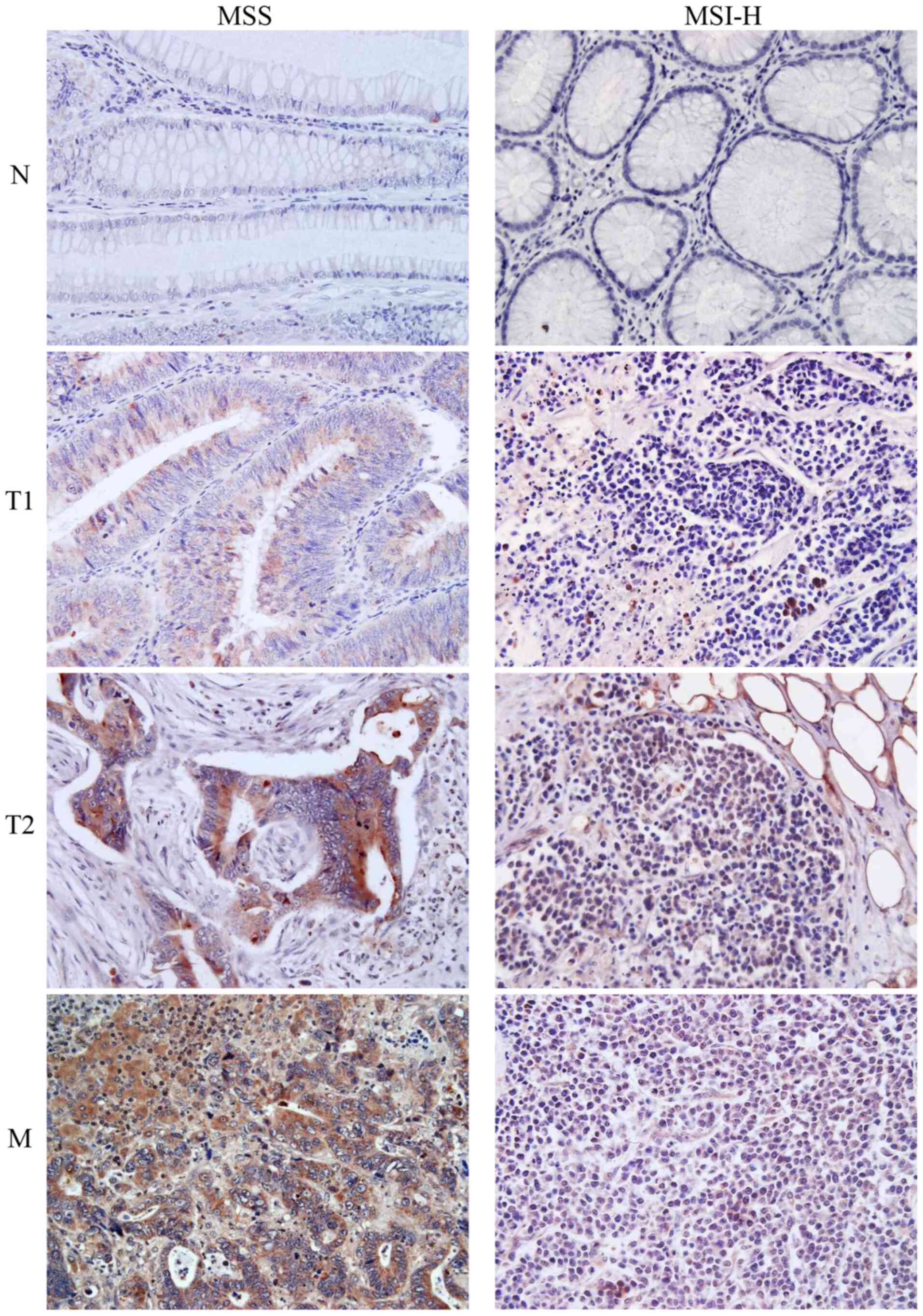|
1
|
Dekker E, Tanis PJ, Vleugels JLA, Kasi PM
and Wallace MB: Colorectal cancer. Lancet. 394:1467–1480. 2019.
View Article : Google Scholar
|
|
2
|
Bray F, Ferlay J, Soerjomataram I, Siegel
RL, Torre LA and Jemal A: Global cancer statistics 2018: GLOBOCAN
estimates of incidence and mortality worldwide for 36 cancers in
185 countries. CA Cancer J Clin. 68:394–424. 2018. View Article : Google Scholar
|
|
3
|
Cohen S: Isolation and biological effects
of an epidermal growth-stimulating protein. Natl Cancer Inst
Monogr. 13:13–37. 1964.
|
|
4
|
Park JH, Han SW, Oh DY, Im SA, Jeong SY,
Park KJ, Kim TY, Bang YJ and Park JG: Analysis of KRAS, BRAF, PTEN,
IGF1R, EGFR intron 1 CA status in both primary tumors and paired
metastases in determining benefit from cetuximab therapy in colon
cancer. Cancer Chemother Pharmacol. 68:1045–1055. 2011. View Article : Google Scholar
|
|
5
|
Spano JP, Lagorce C, Atlan D, Milano G,
Domont J, Benamouzig R, Attar A, Benichou J, Martin A, Morere JF,
et al: Impact of EGFR expression on colorectal cancer patient
prognosis and survival. Ann Oncol. 16:102–108. 2005. View Article : Google Scholar
|
|
6
|
Rego RL, Foster NR, Smyrk TC, Le M,
O'Connell MJ, Sargent DJ, Windschitl H and Sinicrope FA: Prognostic
effect of activated EGFR expression in human colon carcinomas:
Comparison with EGFR status. Br J Cancer. 102:165–172. 2010.
View Article : Google Scholar
|
|
7
|
Lee WS, Baek JH, Lee JN and Lee WK:
Mutations in K-ras and epidermal growth factor receptor expression
in Korean patients with stages III and IV colorectal cancer. Int J
Surg Pathol. 19:145–151. 2011. View Article : Google Scholar
|
|
8
|
Ljuslinder I, Melin B, Henriksson ML,
Oberg A and Palmqvist R: Increased epidermal growth factor receptor
expression at the invasive margin is a negative prognostic factor
in colorectal cancer. Int J Cancer. 128:2031–2037. 2011. View Article : Google Scholar
|
|
9
|
Kang YJ, Jung CK, Choi Y, Lee KY, Kim HJ
and Kang WK: Clinicopathologic significances of EGFR expression at
invasive front of colorectal cancer. Korean J Pathol. 44:16–21.
2010. View Article : Google Scholar
|
|
10
|
Ueno H, Mochizuki H, Hashiguchi Y,
Shimazaki H, Aida S, Hase K, Matsukuma S, Kanai T, Kurihara H,
Ozawa K, et al: Risk factors for an adverse outcome in early
invasive colorectal carcinoma. Gastroenterology. 127:385–394. 2004.
View Article : Google Scholar
|
|
11
|
Morodomi T, Isomoto H, Shirouzu K,
Kakegawa K, Irie K and Morimatsu M: An index for estimating the
probability of lymph node metastasis in rectal cancers. Lymph node
metastasis and the histopathology of actively invasive regions of
cancer. Cancer. 63:539–543. 1989. View Article : Google Scholar
|
|
12
|
Sohn DK, Chang HJ, Park JW, Choi DH, Han
KS, Hong CW, Jung KH, Kim DY, Lim SB, Choi HS and Jeong SY:
Histopathological risk factors for lymph node metastasis in
submucosal invasive colorectal carcinoma of pedunculated or
semipedunculated type. J Clin Pathol. 60:912–915. 2007. View Article : Google Scholar
|
|
13
|
Kawachi H, Eishi Y, Ueno H, Nemoto T,
Fujimori T, Iwashita A, Ajioka Y, Ochiai A, Ishiguro S, Shimoda T,
et al: A three-tier classification system based on the depth of
submucosal invasion and budding/sprouting can improve the treatment
strategy for T1 colorectal cancer: A retrospective multicenter
study. Mod Pathol. 28:872–879. 2015. View Article : Google Scholar
|
|
14
|
Shia J, Klimstra DS, Li AR, Qin J, Saltz
L, Teruya-Feldstein J, Akram M, Chung KY, Yao D, Paty PB, et al:
Epidermal growth factor receptor expression and gene amplification
in colorectal carcinoma: An immunohistochemical and chromogenic in
situ hybridization study. Mod Pathol. 18:1350–1356. 2005.
View Article : Google Scholar
|
|
15
|
Brandt B, Meyer-Staeckling S, Schmidt H,
Agelopoulos K and Buerger H: Mechanisms of egfr gene transcription
modulation: Relationship to cancer risk and therapy response. Clin
Cancer Res. 12:7252–7260. 2006. View Article : Google Scholar
|
|
16
|
Choi JE, Park SH, Kim KM, Lee WK, Kam S,
Cha SI, Kim CH, Kang YM, Kim YC, Han SB, et al: Polymorphisms in
the epidermal growth factor receptor gene and the risk of primary
lung cancer: Acase-control study. BMC Cancer. 7:1992007. View Article : Google Scholar
|
|
17
|
Loupakis F, Cremolini C, Fontanini G,
Stasi I, Salvatore L and Falcone A: Beyond KRAS: Perspectives on
new potential markers of intrinsic and acquired resistance to
epidermal growth factor receptor inhibitors in metastatic
colorectal cancer. Ther Adv Med Oncol. 1:167–181. 2009. View Article : Google Scholar
|
|
18
|
Etienne-Grimaldi MC, Pereira S, Magné N,
Formento JL, Francoual M, Fontana X, Demard F, Dassonville O,
Poissonnet G, Santini J, et al: Analysis of the dinucleotide repeat
polymorphism in the epidermal growth factor receptor (EGFR) gene in
head and neck cancer patients. Ann Oncol. 16:934–941. 2005.
View Article : Google Scholar
|
|
19
|
Frolov A, Liles JS, Kossenkov AV, Tzeng
CW, Jhala N, Kulesza P, Varadarajulu S, Eloubeidi M, Heslin MJ and
Arnoletti JP: Epidermal growth factor receptor (EGFR) intron 1
polymorphism and clinical outcome in pancreatic adenocarcinoma. Am
J Surg. 200:398–405. 2010. View Article : Google Scholar
|
|
20
|
Kersting C, Agelopoulos K, Schmidt H,
Korsching E, August C, Gosheger G, Dirksen U, Juergens H,
Winkelmann W, Brandt B, et al: Biological importance of a
polymorphic CA sequence within intron 1 of the epidermal growth
factor receptor gene (EGFR) in high grade central osteosarcomas.
Genes Chromosomes Cancer. 47:657–664. 2008. View Article : Google Scholar
|
|
21
|
Buerger H, Gebhardt F, Schmidt H, Beckmann
A, Hutmacher K, Simon R, Lelle R, Boecker W and Brandt B: Length
and loss of heterozygosity of an intron 1 polymorphic sequence of
egfr is related to cytogenetic alterations and epithelial growth
factor receptor expression. Cancer Res. 60:854–857. 2000.
|
|
22
|
Amador ML, Oppenheimer D, Perea S, Maitra
A, Cusatis G, Iacobuzio-Donahue C, Baker SD, Ashfaq R, Takimoto C,
Forastiere A and Hidalgo M: An epidermal growth factor receptor
intron 1 polymorphism mediates response to epidermal growth factor
receptor inhibitors. Cancer Res. 64:9139–9143. 2004. View Article : Google Scholar
|
|
23
|
Gebhardt F, Zanker KS and Brandt B:
Modulation of epidermal growth factor receptor gene transcription
by a polymorphic dinucleotide repeat in intron 1. J Biol Chem.
274:13176–13180. 1999. View Article : Google Scholar
|
|
24
|
Lurje G, Nagashima F, Zhang W, Yang D,
Chang HM, Gordon MA, El-Khoueiry A, Husain H, Wilson PM, Ladner RD,
et al: Polymorphisms in cyclooxygenase-2 and epidermal growth
factor receptor are associated with progression-free survival
independent of K-ras in metastatic colorectal cancer patients
treated with single-agent cetuximab. Clin Cancer Res. 14:7884–7895.
2008. View Article : Google Scholar
|
|
25
|
Garm Spindler KL, Pallisgaard N, Rasmussen
AA, Lindebjerg J, Andersen RF, Crüger D and Jakobsen A: The
importance of KRAS mutations and EGF61A>G polymorphism to the
effect of cetuximab and irinotecan in metastatic colorectal cancer.
Ann Oncol. 20:879–884. 2009. View Article : Google Scholar
|
|
26
|
Boland CR and Goel A: Microsatellite
instability in colorectal cancer. Gastroenterology.
138:2073–2087.e3. 2010. View Article : Google Scholar
|
|
27
|
Yuan Z, Shin J, Wilson A, Goel S, Ling YH,
Ahmed N, Dopeso H, Jhawer M, Nasser S, Montagna C, et al: An A13
repeat within the 3′-untranslated region of epidermal growth factor
receptor (EGFR) is frequently mutated in microsatellite instability
colon cancers and is associated with increased EGFR expression.
Cancer Res. 69:7811–7818. 2009. View Article : Google Scholar
|
|
28
|
Buisine MP, Wacrenier A, Mariette C,
Leteurtre E, Escande F, Aissi S, Ketele A, Leclercq A, Porchet N
and Lesuffleur T: Frequent mutations of the CA simple sequence
repeat in intron 1 of EGFR in mismatch repair-deficient colorectal
cancers. World J Gastroenterol. 14:1053–1059. 2008. View Article : Google Scholar
|
|
29
|
Spaventi R, Pecur L, Pavelic K, Pavelic
ZP, Spaventi S and Stambrook PJ: Human tumour bank in Croatia: A
possible model for a small bank as part of the future European
tumour bank network. Eur J Cancer. (30A): 4191994. View Article : Google Scholar
|
|
30
|
Green MR and Sambrook J: Isolation of
high-molecular-weight dna from mammalian blood using proteinase k
and phenol. Cold Spring Harb Protoc. 2017:pdb prot093492. 2017.
View Article : Google Scholar
|
|
31
|
Cacev T, Radosevic S, Spaventi R, Pavelic
K and Kapitanovic S: NF1 gene loss of heterozygosity and expression
analysis in sporadic colon cancer. Gut. 54:1129–1135. 2005.
View Article : Google Scholar
|
|
32
|
Livak KJ and Schmittgen TD: Analysis of
relative gene expression data using real-time quantitative PCR and
the 2(-Delta Delta C(T)) method. Methods. 25:402–408. 2001.
View Article : Google Scholar
|
|
33
|
Mauri G, Pizzutilo EG, Amatu A, Bencardino
K, Palmeri L, Bonazzina EF, Tosi F, Carlo Stella G, Burrafato G,
Scaglione F, et al: Retreatment with anti-EGFR monoclonal
antibodies in metastatic colorectal cancer: Systematic review of
different strategies. Cancer Treat Rev. 73:41–53. 2019. View Article : Google Scholar
|
|
34
|
Tzeng CW, Frolov A, Frolova N, Jhala NC,
Howard JH, Vickers SM, Buchsbaum DJ, Heslin MJ and Arnoletti JP:
Pancreatic cancer epidermal growth factor receptor (EGFR) intron 1
polymorphism influences postoperative patient survival and in vitro
erlotinib response. Ann Surg Oncol. 14:2150–2158. 2007. View Article : Google Scholar
|
|
35
|
Shitara M, Sasaki H, Yokota K, Okuda K,
Hikosaka Y, Moriyama S, Yano M, Kawaguchi T, Kubo A, Takada M, et
al: Polymorphisms in intron 1 of the EGFR gene in non-small cell
lung cancer patients. Exp Ther Med. 4:785–789. 2012. View Article : Google Scholar
|
|
36
|
Arifin M, Hiyama K, Tanimoto K, Wiyono WH,
Hiyama E and Nishiyama M: EGFR activating aberration occurs
independently of other genetic aberrations or telomerase activation
in adenocarcinoma of the lung. Oncol Rep. 17:1405–1411. 2007.
|
|
37
|
Vashist YK, Trump F, Gebauer F, Kutup A,
Güngör C, Kalinin V, Muddasar R, Vettorazzi E, Yekebas EF, Brandt
B, et al: EGFR intron-1 CA repeat polymorphism is a predictor of
relapse and survival in complete resected only surgically treated
esophageal cancer. Target Oncol. 9:43–52. 2014. View Article : Google Scholar
|
|
38
|
Huang SF, Chien HT, Chuang WY, Lai CH,
Cheng SD, Liao CT and Wang HM: Epidermal growth factor receptor
intron-1 CA repeat polymorphism on protein expression and clinical
outcome in Taiwanese oral squamous cell carcinoma. Sci Rep.
7:49632017. View Article : Google Scholar
|
|
39
|
Han SW, Oh DY, Im SA, Park SR, Lee KW,
Song HS, Lee NS, Lee KH, Choi IS, Lee MH, et al: Epidermal growth
factor receptor intron 1 CA dinucleotide repeat polymorphism and
survival of advanced gastric cancer patients treated with cetuximab
plus modified FOLFOX6. Cancer Sci. 101:793–799. 2010. View Article : Google Scholar
|
|
40
|
Zhang W, Weissfeld JL, Romkes M, Land SR,
Grandis JR and Siegfried JM: Association of the EGFR intron 1 CA
repeat length with lung cancer risk. Mol Carcinog. 46:372–380.
2007. View Article : Google Scholar
|
|
41
|
McKay JA, Murray LJ, Curran S, Ross VG,
Clark C, Murray GI, Cassidy J and McLeod HL: Evaluation of the
epidermal growth factor receptor (EGFR) in colorectal tumours and
lymph node metastases. Eur J Cancer. 38:2258–2264. 2002. View Article : Google Scholar
|
|
42
|
Del Carmen S, Corchete LA, Gervas R,
Rodriguez A, Garcia M, Álcazar JA, García J, Bengoechea O,
Muñoz-Bellvis L, Sayagués JM and Abad M: Prognostic implications of
EGFR protein expression in sporadic colorectal tumors: Correlation
with copy number status, mRNA levels and miRNA regulation. Sci Rep.
10:46622020. View Article : Google Scholar
|
|
43
|
Teixeira AL, Gomes M and Medeiros R: EGFR
signaling pathway and related-miRNAs in age-related diseases: The
example of miR-221 and miR-222. Front Genet. 3:2862012. View Article : Google Scholar
|
|
44
|
Jurisic V, Vukovic V, Obradovic J,
Gulyaeva LF, Kushlinskii NE and Djordjevic N: EGFR Polymorphism and
survival of NSCLC patients treated with TKIs: A systematic review
and meta-analysis. J Oncol. 2020:19732412020. View Article : Google Scholar
|
|
45
|
Tomas A, Futter CE and Eden ER: EGF
receptor trafficking: Consequences for signaling and cancer. Trends
Cell Biol. 24:26–34. 2014. View Article : Google Scholar
|
|
46
|
Seth D, Shaw K, Jazayeri J and Leedman PJ:
Complex post-transcriptional regulation of EGF-receptor expression
by EGF and TGF-alpha in human prostate cancer cells. Br J Cancer.
80:657–669. 1999. View Article : Google Scholar
|
|
47
|
Buckowitz A, Knaebel HP, Benner A, Bläker
H, Gebert J, Kienle P, von Knebel Doeberitz M and Kloor M:
Microsatellite instability in colorectal cancer is associated with
local lymphocyte infiltration and low frequency of distant
metastases. Br J Cancer. 92:1746–1753. 2005. View Article : Google Scholar
|
|
48
|
Goldstein J, Tran B, Ensor J, Gibbs P,
Wong HL, Wong SF, Vilar E, Tie J, Broaddus R, Kopetz S, et al:
Multicenter retrospective analysis of metastatic colorectal cancer
(CRC) with high-level microsatellite instability (MSI-H). Ann
Oncol. 25:1032–1038. 2014. View Article : Google Scholar
|
|
49
|
Xiao Y and Freeman GJ: The microsatellite
instable subset of colorectal cancer is a particularly good
candidate for checkpoint blockade immunotherapy. Cancer Discov.
5:16–18. 2015. View Article : Google Scholar
|
|
50
|
Kloor M and von Knebel Doeberitz M: The
immune biology of microsatellite-unstable cancer. Trends Cancer.
2:121–133. 2016. View Article : Google Scholar
|
|
51
|
Perucho M: Tumors with microsatellite
instability: Many mutations, targets and paradoxes. Oncogene.
22:2223–2225. 2003. View Article : Google Scholar
|
|
52
|
Theodoropoulos GE, Karafoka E, Papailiou
JG, Stamopoulos P, Zambirinis CP, Bramis K, Panoussopoulos SG,
Leandros E and Bramis J: P53 and EGFR expression in colorectal
cancer: A reappraisal of ‘old’ tissue markers in patients with long
follow-up. Anticancer Res. 29:785–791. 2009.
|


















